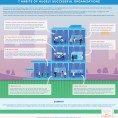It’s challenging to know when the right time is to introduce various technologies to your kid. You don’t want to allow them access to every connected app or device, but you also want to let your kids be creative and access the best that the high-tech world has to offer. Our book Parenting High-Tech Kids: The Ultimate Internet, Web, and Online Safety Guide showed us that parents were generally confused about this topic, so here’s a helpful guide to what’s appropriate for elementary-school age children.
By the time that kids finish kindergarten, chances are that they will have been exposed to many of the most common technological devices, all of which offer myriad ways to connect online. As they progress through grade school, they’ll inevitably graduate to more advanced devices, and before you know it, you’ll soon be dealing not only with how this technology works, but also how to best control, monitor and safeguard the activities they’re using it for.
One of the biggest personal advancements for kids around this age is mastering the ability to read… and not just because of the joy they’ll experience by exploring the wonderful world of books. Reading actually opens vast new frontiers of information for sprouts, who’ll suddenly find themselves able to operate and program a DVR, follow on-screen instructions in video games, and surf the Web. The ability to read introduces entirely new ways for kids to interact with and use the Internet, even if they’re still too young to have their own e-mail address.
From a parent’s perspective, it’s also important to ensure that you’ve got control of your cable or satellite service at this point, as kids this age will certainly become adept at using the remote. Make sure you’ve blocked adult and other materials. Some service providers even require users to setup parental controls the first time they use their service, choosing which material and content to block and which to allow before viewing programs. It won’t come as a surprise when more providers start employing similar requirements in increasing numbers as a default installation option, and such actions will certainly help encourage more parents to use these built-in safety features.
Video Games: It is at this age that many parents will first consider introducing a video game console to their home. We recommend disabling any online features such systems offer to kids this young. By this point, kids should also posses the coordination needed to handle today’s video game controllers, including gesture-tracking systems in which your body acts as the controller.
Many families struggle when deciding which gaming system to buy their family. But many good answers present themselves: Nintendo’s Wii and Wii U, Microsoft’s Xbox One and Sony’s PlayStation 4 all provide welcome options for families, with many child-friendly titles. Kids this age will also enjoy playing handheld games, whether it’s on your smartphone or via systems like the PlayStation Vita or the Nintendo 3DS – however, be aware that such systems may offer online access, downloadable apps, social networking abilities and/or location-tracking features. Be certain to set online, privacy and parental controls before handing them over.
Internet and Web Access: Whether at home or via the school computer lab, by this age, kids will enjoy widespread access to computers and the Internet. This is a great developmental stage at which to sharpen and develop smart computing habits, including learning to type and communicate. In terms of actual high-tech activity, there is likely to still be a heavy focus amongst kids on games and educational material at this point in time. That said, stick to websites and services that you know are reputable, or come highly recommended by real-life friends and family. With so many great choices out there, there’s no reason for kids to end up on random sites that may contain inappropriate content or malware. Looking for symbols such as certification from organizations like KidSAFE will ensure that sites are compliant with the latest privacy-protection policies for minors.
E-mail: Many kids this age are considered still too young to have their own e-mail address – you might well consider prohibiting access until they’re older.
Cell Phones and Mobile Devices: At this stage of life, kids still don’t need their own cell phones, as they’ll be largely chaperoned during real-life and virtual activities. However, it’s likely that at this age they’ll also be asking for even more time with the family’s tablet computer or apps on mom and dad’s smartphone. Be cautious with the content which you allow them to consume, and cognizant of online connectivity or in-app purchase features contained within apps, software, sites and services that children are allowed access to.
Social Networks: During the early elementary years, kids will start to become more aware of social networks like Facebook and Twitter simply because they’ll hear parents, family, teachers, TV personalities and others talk about them. It’s OK to show children posts or photos from family or friends that are age-appropriate as well – but don’t get sucked into using these networks obsessively while they’re around. It sets a bad example, and potentially exposes kids to seeing inappropriate content and issues for which they’re developmentally and intellectually unprepared to greet.
Tips:
- At this stage in life, you might consider increasing screen time limits, and adding or subtracting time as a reward for good behavior, or punishment for bad behavior. Apps like Screen Time provide easy ways to start with a baseline number and manage from there. Kids can also “bank” their screen time in an effort to earn other real-life rewards, like a trip to the amusement part or other special activity.
- Enforce device-free times. In addition to a technology blackout at dinner, consider a family movie or game night in which everyone promises to give their full attention without being distracted by their phones or other forms of technology.
- Sit down with your kids while they play games online. It’s a great way to connect and learn about how they’re using these digital diversions, and provides you with great chances for discussion concerning a number of related topics. Parents who play games with their kids report a higher sense of connection, and studies have shown that girls especially benefit from this parental bonding time.
- Remember the importance of password protection and privacy. Establish your family’s password policy and practices while kids are just beginning to get up to speed with technology.
For more, also be sure to see Parenting High-Tech Kids: The Ultimate Internet, Web, and Online Safety Guide.














